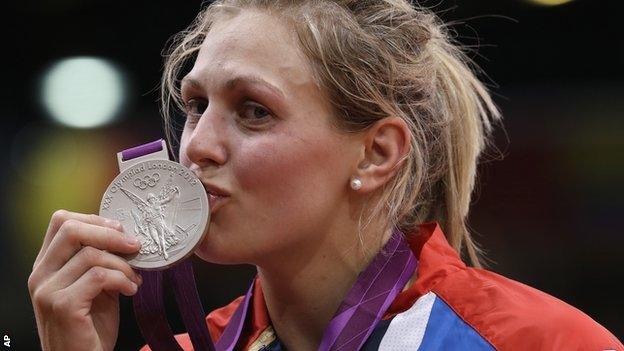Olympics judo: Gemma Gibbons puts silver lining on judo showing
- Published

Two hours before Gemma Gibbons was fighting for gold at the ExCeL Arena, I was having a coffee with Patrick Roux, her former international coach, who gave me a forensic breakdown of where he believed British judo had gone wrong.
But just before we parted, he smiled, drew me closer and said: "Let's wait and see what happens with Gemma before you do anything with those quotes."
Until Gibbons's silver medal in the women's -78kg, the London Games had been pretty dispiriting fare for the 14-strong British squad, with only one home judoka, Colin Oates, making it as far as a quarter-final.
Gibbons's boyfriend Euan Burton broke down in tears after being knocked out of the -81kg division on Tuesday.
British Judo chairman Densign White chose the middle of an Olympics to berate the home players for being soft and lacking commitment. Three-time Olympian Winston Gordon said British judo was "rotting from the head".
GB's Gibbons wins silver
But two hours is a long time in sport. The sight of local girl Gibbons slumped to her knees, before standing and looking to the sky, mouthing "I love you, Mum" following her semi-final win over reigning world champion Audrey Tcheumeo is merely a heart-warming chapter within, rather than the end of, what promises to be a tortuous story.
But, because of the restorative nature of sport, it allowed those watching to believe that all was right with the world again. Momentarily, at least.
Up in the stands, Daniel Lascau, who succeeded Roux as head coach of the Great Britain team, was a model of relief. "You've won a medal!" roared a member of the backroom team, clearly almost relieved as him. "I haven't won anything," said Lascau, "and we haven't even started yet…"
In the final, American Kayla Harrison had too much hustle, despite the backing of Prime Minister David Cameron, his new best mate Vladimir Putin and a crowd of 7,000 fellow Brits, many of them undoubtedly judo virgins.
Whether Putin was impressed was difficult to tell - the Russian president, who fancies himself as a judoka, probably thought he could have taken the both of them. But the kids all around me certainly liked what they saw, which is surely all that counts.
"I want to say thank you and obviously I can't," said Gibbons of her mum, Jeanette, who died of leukaemia in 2004. "There has been a lot of hard work and a lot of ups and downs, and it's all come together at the best possible time.
"It does not quite feel real at the moment. It has been difficult to get here, but it is not easy for any athlete. When you are training as hard as you can but not getting results in competitions, you do think 'what do I have to do?'
"Deep within, though, I always knew I could do something special, and that is what drives you on. Hopefully lots of people had the chance to watch it."
While most of the crowd remained trained on Gibbons, Harrison, the first American to win judo gold at an Olympics, clambered into the crowd to share the moment with coaches, support staff and loved ones.
Harrison, a 22-year-old, has a back-story of her own. Sexually abused by a coach as a teenager, she moved to Wakefield, Massachusetts six years ago and came under the tutelage of Jimmy Pedro, a four-time Olympian and two-time bronze medallist. Together, they worked out how to turn bronze into gold.
"You're talking about somebody who came from the lowest point in life," said Pedro. "She didn't know if she wanted to go on. So to be now stepping on top of the podium as an Olympic champion…" Pedro did not need to say any more.
"Never give up on your dreams," said Harrison. "If I can do it, anybody can do it. Despite all the things that happened, now my life is a dream."
Roux, having been sacked by British Judo last September, knows better than most that sport is a series of disasters followed by a minor miracle. Which is why he knows to make the most of the good times, and which is why his story can wait for tomorrow.